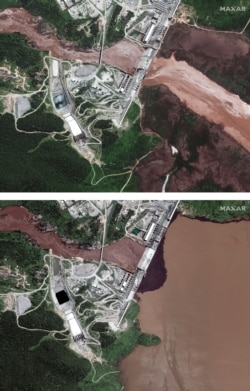Ethiopian officials are demanding an explanation from the U.S. after it announced this week it would cut millions of dollars in aid after Ethiopia’s decision to begin filling a reservoir at a massive hydropower dam on the Nile River. Egypt and Sudan are opposed to the dam, which they fear could reduce their water supply, unless a binding agreement over how it is filled can be reached with Ethiopia.
The U.S. State Department on Wednesday announced it would place a “temporary pause” on tens of millions of dollars in foreign assistance to Ethiopia, in response to authorities there filling a reservoir at the Grand Ethiopian Renaissance Dam (GERD).
Egypt, Ethiopia and Sudan have been locked in a bitter dispute over the GERD and the waters of the Nile for nearly a decade.
The U.S. entered the fray last year and attempted to broker an agreement, only for Ethiopia to step away from those talks due to suspicions over a bias in Washington towards Egypt.
Eyob Tekalign, Ethiopia’s state finance minister, told VOA that the government has requested the U.S. provide a full explanation for the aid cut. He also said he believed the situation can be resolved quickly.
“We don’t think that the U.S. has thought this through carefully because the partnership with the U.S. and Ethiopia is solid, very strong and continues to be," he said. "We consider this a misunderstanding. We don’t think this will last. We are very hopeful that they will reconsider because Ethiopia is doing what is absolutely right in all senses of the word legally, morally as well.”
In Washington, talks over whether to cut aid to Ethiopia have been going on for weeks.
While some State Department officials opposed the move due to the possible diplomatic fallout, others close to the White House and President Donald Trump pushed to make an example of Ethiopia for starting to fill the reservoir without first getting an agreement with Egypt and Sudan.
A State Department official told VOA in a statement that the decision to pause assistance for Ethiopia reflects concerns about Ethiopia’s unilateral decision to fill the dam before "an agreement and all necessary dam safety measures were in place."
The official also stipulated the decision was "based on guidance from the president" and that cuts would not be made to programs tackling HIV/AIDS, conflict, drought, displacement, and other humanitarian challenges.
The cuts will impact programs linked to regional security and could amount to roughly $100 million.
Rashid Abdi, a senior analyst on Horn of Africa politics, told VOA that the aid suspension may also be tied to Ethiopia’s recent crackdown on opposition leaders and supporters, following protests that erupted after the death of the popular Oromo singer Hachalu Hundessa.
“There is a growing, I think, discontent with Abiy’s leadership style but also the country’s authoritarian drift. This could be a signal to put Abiy on notice and tell him ‘look our strategic relationship could be damaged if you continue down this path,’” he said.
The next round of discussions between Egypt, Ethiopia and Sudan is scheduled for September 14.






